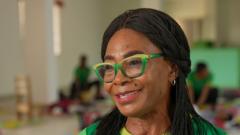The article text:
At just 22 years old, Babatunde Fashola, lovingly called Baba, stands less than 70cm tall due to cerebral palsy. Despite being abandoned as a baby, he found a loving home 10 years ago at the Cerebral Palsy Centre in Lagos, Nigeria. The founder, Nonye Nweke, and her team provide essential care for him and other children facing similar challenges. Cerebral palsy is prevalent in Nigeria, with an estimated 700,000 affected, primarily due to neonatal jaundice—a common, treatable condition not always addressed promptly.
As highlighted by paediatrician Professor Chinyere Ezeaka, untreated jaundice can lead to severe brain damage. Despite this, Nigeria ranks high in cases of neurological disorders caused by jaundice due to a lack of immediate medical intervention. Nweke established the center after experiencing the isolation that can stem from caring for children with special needs. Her daughter Zimuzo, now 17, was diagnosed with cerebral palsy shortly after adoption.
At the center, bright play areas warm the atmosphere, but the realities of caregiving are tough. With a high cost of care ($1,000 a month) and limited funding, Ms. Nweke is dedicated but overwhelmed. She faces societal stigma, where some believe that children with disabilities are spiritually cursed. Helping tackle these beliefs is Project Oscar, a charity that plans to improve diagnostic and treatment equipment in Nigeria's health facilities while training health workers to combat neonatal jaundice effectively.
Although the Nigerian public health system struggles, the hope is to protect more infants through awareness and education. Oscar Anderson, the inspiration behind the project, stresses that people with disabilities deserve recognition and support. Despite daunting challenges, Nweke and her partners are committed to making a difference for many Nigerian families living with the effects of cerebral palsy.
At just 22 years old, Babatunde Fashola, lovingly called Baba, stands less than 70cm tall due to cerebral palsy. Despite being abandoned as a baby, he found a loving home 10 years ago at the Cerebral Palsy Centre in Lagos, Nigeria. The founder, Nonye Nweke, and her team provide essential care for him and other children facing similar challenges. Cerebral palsy is prevalent in Nigeria, with an estimated 700,000 affected, primarily due to neonatal jaundice—a common, treatable condition not always addressed promptly.
As highlighted by paediatrician Professor Chinyere Ezeaka, untreated jaundice can lead to severe brain damage. Despite this, Nigeria ranks high in cases of neurological disorders caused by jaundice due to a lack of immediate medical intervention. Nweke established the center after experiencing the isolation that can stem from caring for children with special needs. Her daughter Zimuzo, now 17, was diagnosed with cerebral palsy shortly after adoption.
At the center, bright play areas warm the atmosphere, but the realities of caregiving are tough. With a high cost of care ($1,000 a month) and limited funding, Ms. Nweke is dedicated but overwhelmed. She faces societal stigma, where some believe that children with disabilities are spiritually cursed. Helping tackle these beliefs is Project Oscar, a charity that plans to improve diagnostic and treatment equipment in Nigeria's health facilities while training health workers to combat neonatal jaundice effectively.
Although the Nigerian public health system struggles, the hope is to protect more infants through awareness and education. Oscar Anderson, the inspiration behind the project, stresses that people with disabilities deserve recognition and support. Despite daunting challenges, Nweke and her partners are committed to making a difference for many Nigerian families living with the effects of cerebral palsy.



















